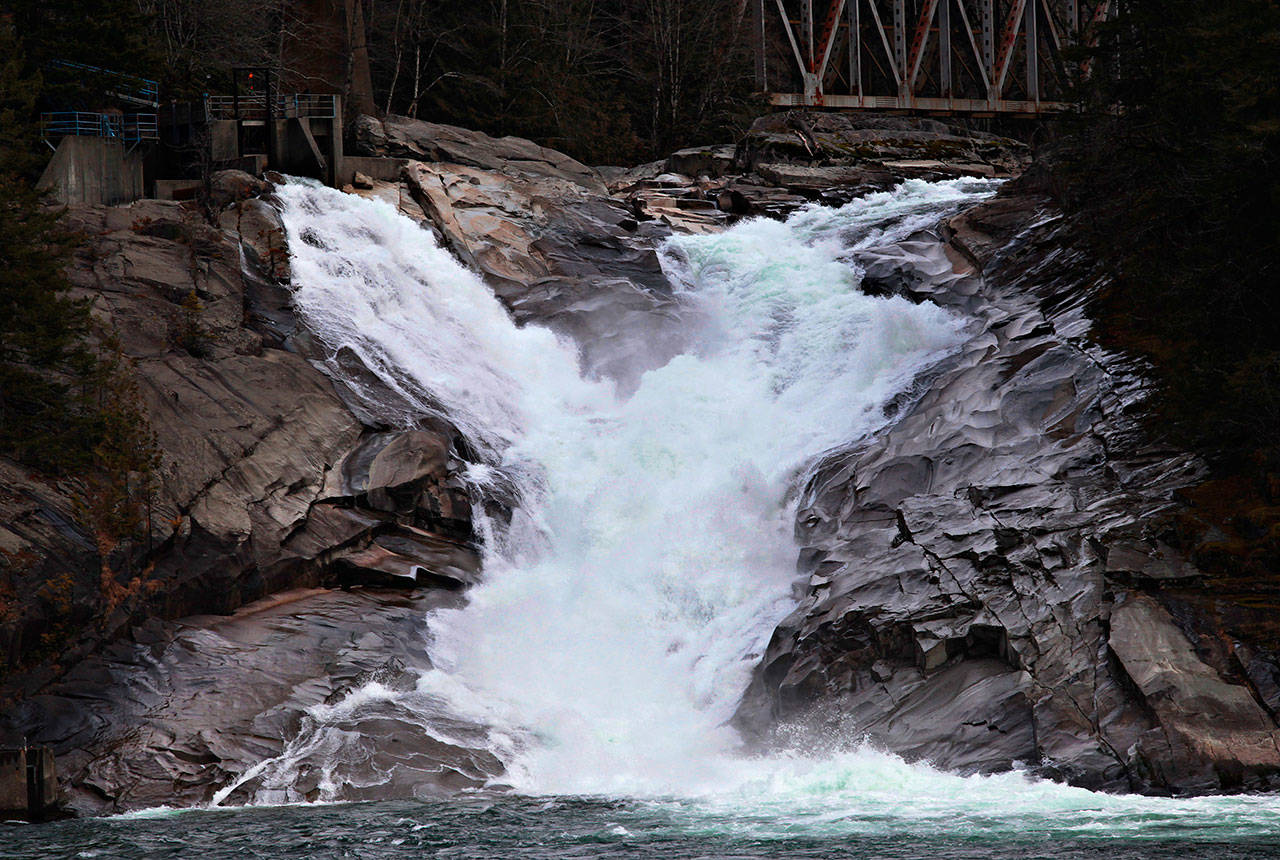By The Herald Editorial Board
In a small way, that LED lightbulb you swapped for a old-fashioned incandescent bulb or the Energy Star-rated fridge you bought had a part in the decision by the Snohomish County Public Utility District to halt plans for a controversial hydropower project on the Skykomish River.
Tuesday, the PUD’s three-member board of commissioners voted to withdraw its application for its final federal license for a $170 million project at Sunset Falls on the South Fork of the Skykomish near Index.
First proposed in 2011, the project initially envisioned an inflatable weir that would have blocked and diverted water through turbines at the falls. The project was changed in 2014, eliminating the weir and replacing it with an underground tunnel that would have diverted much of the water around the lowest falls, through hydropower turbines and back into the Skykomish River channel.
The project was expected to generate enough power for about 10,000 to 13,000 homes served by the publicly owned utility. It faced constant opposition, however, from county residents, environmental groups, its own ratepayers and the region’s tribes.
But the PUD now acknowledges it has a better way to capture that energy, one that won’t effect the scenic views of the falls and doesn’t carry with it potential impacts for spawning salmon or young smolts. In a word: conservation.
“The PUD’s energy planning has forecasted that on an annual basis, over the next 10 years, due to expected energy conservation, the PUD will not need the additional energy that the Sunset Hydropower Project would provide,” PUD spokesman Neil Neroutsos told The Herald.
Fittingly enough, the board’s decision Tuesday on the Sunset Falls project followed its review of the PUD’s proposed Integrated Resource Plan, which plots out energy demand and supply from now until 2037. The board is expected to formally adopt the plan later this May, but it already assumes that the PUD can meet the steady — but slow — growth in demand by viewing conservation as its “resource of choice.”
Charts in the draft plan show no change in the amount of energy from existing resources, such as from hydropower from its facilities and from the Bonneville Power Administrations’s dams on the Columbia and Snake rivers. But the PUD report shows growth in both new conservation savings and from other long-term capacity resources, such as its research and development into large-scale battery storage, enough to meet expected demand.
The plan recognizes uncertainties that could cloud the forecast, including the possibilities that climate change or policy changes could reduce the availability of hydropower from BPA and its own generating stations. But the PUD isn’t the only organization predicting a steady growth in conservation’s ability to meet increased demand during the next 20 years.
“The slow pace of growth in electricity demand is unprecedented,” according to the Northwest Power and Conservation Council, a federal commission that guides policy on power, fish and wildlife for Washington, Oregon, Idaho and Montana, in its most recent power plan.
The NWPCC report predicts an increase in energy demand for the Pacific Northwest of up to 1 percent. That’s low when one considers projected growth in population and business in the Northwest.
“Cost-effective efficiency improvements identified in this Seventh Power Plan are anticipated to meet most if not all of this projected growth under most future conditions,” it reports in its key findings. “After accounting for the impact of new cost-effective conservation that should be developed over the 20-year period …, the need for additional generation is forecast to be quite small compared to historical experience.”
But this assumes continued adoption and development of conservation efforts, something that has been less clear during the Trump administration.
Although the proposed budget cuts were rebuffed by Congress, the Trump administration sought cuts to a range of energy efficiency programs at the Environmental Protection Agency, most notably the Energy Star program, which would have been eliminated. Energy Star — a public-private partnership whose blue and white labels help consumers chose appliances based on their energy efficiency — has helped consumers save $362 billion on utility bills and has reduced pollution since its start in 1992.
Also targeted for deep cuts or elimination were the Department of Energy’s Office of Energy Efficiency and Renewable Energy, weatherization assistance grants to states and funding for other state energy programs.
The programs above and others, along with advances in energy-efficient products and services, have to be protected to meet the Northwest’s and the nation’s energy demands while we enjoy a decrease in the impacts from generating that energy.
The PUD deserves appreciation for recognizing the Sunset Falls project was no longer necessary. You deserve it for changing that lightbulb.
Talk to us
> Give us your news tips.
> Send us a letter to the editor.
> More Herald contact information.

























